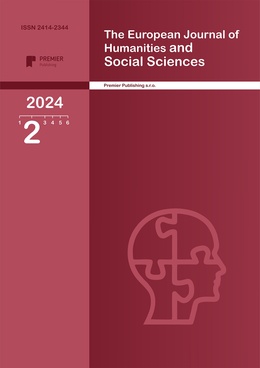IMPROVING THE METHODOLOGICAL PREPAREDNESS OF FUTURE FOREIGN LANGUAGE TEACHERS IN THE CONTEXT OF DIGITAL EDUCATION
Authors
Feruza Erkulova Melikuziyevna

Share
Annotation
The article investigates the center strategies of moving forward the proficient preparing of instructors of the long run within the advanced change of instruction. The point of the article is to distinguish exercises that are aiming to guarantee the quality preparing of instructors of long-term within the computerized change of instruction. It is proposed to develop the human asset potential of future instructors who are prepared to carry out educational exercises in a computerized environment. The steps are taken to make the conditions for the professional preparing of the educator of long term in terms of the improvement of modern instructive programs and the incorporation in existing instructive programs of modern subjects related to the arrangement of the computerized competences of the educator, Modernizing the substance of instructive subjects, presenting unused models of instructing, and coordination mass open online courses (MOOC) into instructive programs. Extraordinary consideration is paid to the computerized change of the college, the advanced change of the educator, the idiosyncrasies of the understudies of the unused era - era «Z», the have to be present the teach «Digital didactics» into the substance of instructive programs, Institutionalization of the mentoring framework as an imperative asset for the improvement of the polished skill of teachers, the improvement of modern essential and complementary instructive programs pointed at preparing teachers of the future and filling proficient shortfalls. Abilities have been distinguished inside the system of the advanced competence of the instructor, which are proposed to be developed during the implementation of unused instructive programs.
Keywords
Authors
Feruza Erkulova Melikuziyevna

Share
References:
- Belyakova, E. G., & Zakharova, I. G. (2019). Interaction of students of the university with educational content in the information educational environment. Education and science, 21(3), 77-105.
- Bozkurt, A., Ozdamar, K. N., & Waard, I. de (2016). Research Trends in Massive Open Online Course (MOOC). Theses and Dissertations: Surfing the Tsunami Wave. Open Praxis, 8(3), 203–221.
- Bykova, E. A. (2019). Formation of motivation for innovative activity among students –future teachers. Prospects for Science and Education, 4, 102-115. https://doi.org/10.32744/pse.2019.4.9
- Cabellon, E. T., & Junco, R. (2015). The digital age of student affairs. New Directions for Student Services, 151, 49–61. https://doi.org/10.1002/ss.20137
- Deryabina, S. A., & D'yakova, T. A. (2018). A Foreign Language Teacher’s Professiogram in the Conditions of Digitalization of the Educational Process. The European Proceedings of The European Proceedings of Social & Behavioural Sciences, 51, 600-607. https://doi.org/10.15405/epsbs.2018.12.02.65
- Evans, S., & Myrick, J. G. (2015). How MOOC Instructors View the Pedagogy and Purposes of Massive Open Online Courses. Distance Education, 36(3), 295-311. https://doi.org/10.1080/01587919.2015.1081736
- Hashim, H. (2018). Application of technology in the digital era education. International Journal of Research in Counseling and Education, 1(2), 1–5. https://doi.org/10.24036/002za0002
- Hilltdinova, E. U., Belyaeva, T. K., & Lebedeva, I. V. (2019). Digital pedagogy: features of the evolution of the term in the categorical-conceptual apparatus of pedagogy. Prospects for Science and Education, 4(40), 33-43. https://doi.org/10.32744/pse.2019.4.3
- Saykili, A. (2019). Higher education in the digital age: The impact of digital connective technologies. Journal of Educational Technology & Online Learning, 2(1), 1-15. https://doi.org/10.31681/jetol.516971
- Schejbal, D. (2012). In search of a new paradigm for higher education. Innovative Higher Education, 37(5), 373–386. https://doi.org/10.1007/s10755-012-9218-z
- Zakharova, U. S., & Tanasenko, K. I. (2019). MOOC in higher education: advantages and disadvantages for teachers. Education, 3, 176-202. https://doi.org/10.17323/1814-9545-2019-3-176-202


